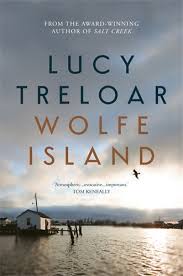Wolfe Island (Picador Pan Macmillan) is the second novel from Lucy Treloar, the award-winning author of the historical Salt Creek. Wolfe Island takes us into the future instead of the past and is set on the other side of the world, in Chesapeake Bay, where the seas are rising as climate change is slowly devastating the land, reclaiming houses piece by piece. Kitty Hawke, the last inhabitant of the dying island of Wolfe, clings to her precarious existence with her wolfdog, Girl, and her makings – her repurposing of found materials into weird and wonderful, poignant and frightening, exotic and memorable sculptural artistic objects that she sells to eager collectors on the mainland. But everything changes the day Kitty’s granddaughter, Cat, arrives on a boat, with three others, escaping from who knows what, fleeing from someone or something, needing a place to hide and heading for the isolation of Wolfe Island and the unknown but assumed sanctuary of her grandmother. Kitty is unaccustomed to the company of kin or strangers and has long become used to her hermit lifestyle. But Cat is her granddaughter.
What follows is an incredible story of sacrifice, determination, hunter and prey, blood ties, the fragility of family, and the connection of the family we create ourselves from those unrelated that we collect along the way.
Lucy Treloar’s writing is assured, evocative, atmospheric and captivating. The literary language sings from the pages, each line a considered thought or a poetic image wrangled into the shape of sentences that make up a tense and frightening narrative. The characterisation is brilliant – Kitty is a strong and self-sufficient woman who makes a series of choices that we are privileged to witness from inside her head, as we journey with her as she grapples with those choices and their effects. The backstory of her family – her estranged husband, the fates of her children, her unfamiliar grandchild – are subtly woven throughout the book. Treloar never gives us too much too fast, but ekes out our curiosity with every chapter, with every new revelation.
This is a story about exile and Home, about belonging and escape, about the solidity of familiarity and the danger of strangeness. Wolfe Island is a modern parable about refugees and climate change, about power and protection, about greed and corruptibility, about the fear of those who have enough and the even stronger fear of those who have nothing. It is about the bond between dogs and humans, and about the necessary evils we commit to protect those we love. It’s about the acts we choose to do, or are forced to do, or decide not to do, and the repercussions of the totality of our actions. It is about guilt and cruelty and redemption and the powerful pull of the place we call Home. It is a prescient fable about the state of the world in which we live, and the terrible possibilities of the world of tomorrow, and the strength and will required from everyone, young and old, to survive. It depicts a world we find hard to imagine, and yet one which is instantly recognisable and believable. Without ever hitting the reader over the head with its message, the meaning and significance is unavoidable and clear: politics matter; climate change matters; our response to those less fortunate matters; our responsibility to the environment and to others – our humanity – ultimately matters most of all. This is a story of great empathy and compassion. It will stay with you – the issues, the characters, the themes, the difficulties, the attempts to right wrongs, the determination to survive, the love, the loss, the grief, the endless turning of the world and the impossible continuation of our very small lives within it. And the writing itself will have you staring at every page in awe and wonder. Wolfe Island is an impressive achievement on so many levels, and I suspect it will affect different readers in varying ways, according to their own circumstances. I found it beautiful, compelling and unforgettable.

